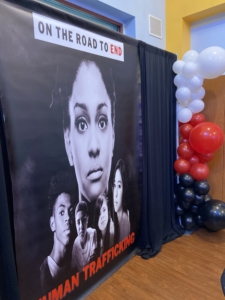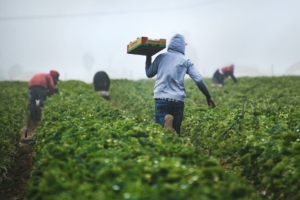January 25, 2022: Labor Trafficking and Male Survivors

During the month of January, which is National Trafficking Prevention Month, Covenant House Special Populations team, headed by Sheri Combs, partnered with Lugine Gray, a former Covenant House Special Populations and Human Trafficking Case Manager and current Coordinator at the Louisiana Child and Youth Trafficking Collaborative, to speak to staff and residents about human trafficking in Louisiana.
This blog post will highlight topics that Lugine spoke to: labor trafficking survivors, particularly youth forced into criminal activity, and male survivors. Thank you, Lugine, for sharing this information with our youth and staff!
What do you think of when you hear the words “human trafficking”? Close your eyes and create your idea of the typical human trafficking survivor.
Did you see a 13-year-old boy forced by a relative to steal cars? What about a father of four, trapped in a cycle of debt he’s told he can only pay off by continuing to lay bricks, day after day in the hot sun?
It is difficult to shake cultural narratives and societal norms. The narrative of human trafficking often only encapsulates one type of survivor: one of sex trafficking, typically a feminine-presenting one.
Defining Trafficking
Per the Trafficking Victims Protection Act of 2000, trafficking in persons falls under two categories:
- Sex Trafficking – “the recruitment, harboring, transportation, provision, obtaining, patronizing, or soliciting of a person for the purpose of a commercial sex act, in which the commercial sex act is induced by force, fraud, or coercion, or in which the person induced to perform such act has not attained 18 years of age.
- Labor Trafficking – “the recruitment, harboring, transportation, provision, or obtaining of a person for labor or services, through the use of force, fraud, or coercion for the purpose of subjection to involuntary servitude, peonage, debt bondage, or slavery.” Worldwide, experts believe there are more cases of labor trafficking than of sex trafficking and “the International Labor Organization estimates worldwide that there are 246 million exploited children aged between 5 and 17 involved in debt bondage, forced recruitment for armed conflict, prostitution, pornography, the illegal drug trade, the illegal arms trade and other illicit activities around the world.”
Youth Forced into Criminal Activity
While not always the case, youth forced into criminal activity occurs all over the world, including here in New Orleans. This includes selling counterfeit DVDs, theft, begging, and more.
Young people are one of the most vulnerable groups targeted for human trafficking. They are more easily recruited, easily replaced, relatively cheap, and often the punishments for youth are less harsh than adults – but not always.
There have been some efforts to protect young human trafficking survivors. Some states have enacted laws to protect anyone under the age of 18 and engaged in sex work from being charged with prostitution. Louisiana is one such “Safe Harbor ” state where young survivors are protected from being prosecuted for prostitution and are instead referred to non-punitive specialized services. Of all 50 states, only (at least) 34 have passed Safe Harbor Laws. Oftentimes, these laws only protect survivors of sex trafficking, not of labor trafficking of youth forced into criminal activity.
Safe Harbor Laws
While Louisiana does offer some protection for labor trafficking survivors (including those committing forced crime), the Safe Harbor Laws do not directly apply to forced labor. Louisiana is one of 22 states to not provide immunity from jail or diversion to rehab as an option for these survivors; however, it is one of 31 states that allows for an affirmative defense (like claiming insanity or self defense) by survivors, allowing for sentences to possibly be lowered. Louisiana is also among 29 states that allows survivors to expunge, vacate, or seal criminal records, but this only applies to minors (read a local news story here).
Think about an instance where you have heard of a child (perhaps referred to as a “juvenile”) charged as an adult for crimes committed. Children charged as adults are far more likely to commit additional offenses and reenter the system (otherwise known as “recidivism”) than those who enter the juvenile system. A study in Pennsylvania found that children charged as adults were two times as likely to be rearrested within 18 months than their peers charged in an age-appropriate juvenile court.
Recidivism isn’t the only life-altering consequence, as adult felony convictions affect the resources, services, and employment opportunities available to individuals with these on their records. With a felony conviction, individuals often “do not qualify for state or federal assistance programs, cannot live in public housing”, are barred from many employment opportunities (see more on the “Ban the Box” movement), and again, are more likely to re-enter the system. An individual’s rights vary from state to state.
How can we expect anyone to recover if they are barred from basic services and meaningful employment? How do we break this cycle and create new pathways of hope for survivors?
Male Survivors
Per a 2016 study, boys/young men comprised more than a third of people involved in commercial sex trade. Of those individuals, Black, Indigenous, or people of color (BIPOC) and LGBTQ+ youth are the highest risk of trafficking. Male victims are found in all sectors in addition to commercial sex, such as farming, mining, hospitality, and construction.
Unfortunately, many states offer zero shelters or programming for male trafficking survivors. The first shelter in the USA exclusively for male survivors of sexual abuse opened in 2021 in Denton, Texas. This still excludes survivors of labor trafficking.
One Survivor’s Story
Covenant House has worked with hundreds of trafficking survivors over the years, including male survivors and survivors of labor trafficking. The following story is from Sheri Combs, our Human Trafficking Special Populations Sr. Program Manager:
 “One young man came to the U.S. for a better life. His dream as a single father was to eventually have enough money to send for his baby daughter. He was sent to a farm in rural Louisiana where he was forced to work from 5 a.m. to midnight and was not allowed water throughout the day, minimal food, and the trailer on the farm he slept in had no electricity, no bedding, etc. The owner of the land often used force to discipline him and threatened to turn him into immigration. He also threatened to order the man’s daughter hurt, claiming he knew a lot of people in Mexico.
“One young man came to the U.S. for a better life. His dream as a single father was to eventually have enough money to send for his baby daughter. He was sent to a farm in rural Louisiana where he was forced to work from 5 a.m. to midnight and was not allowed water throughout the day, minimal food, and the trailer on the farm he slept in had no electricity, no bedding, etc. The owner of the land often used force to discipline him and threatened to turn him into immigration. He also threatened to order the man’s daughter hurt, claiming he knew a lot of people in Mexico.
The survivor was able to escape off of the farm and contacted the FBI. The FBI recovered him and brought him to Covenant House. He was malnourished, tired, and very afraid his daughter was now at risk of being hurt. With Covenant House’s support and the FBI’s Victim Advocate, we were able to relocate and reunite him with his daughter and other family. He still reaches out from time to time to this day, thanking us for our support.”
Stay Tuned
Our next blog will highlight the work done by Covenant House for human trafficking survivors and ways to support survivors.
Sources
https://www.ncsl.org/research/civil-and-criminal-justice/human-trafficking-laws.aspx
https://www.apa.org/monitor/2017/04/sex-trafficking
https://collectiveliberty.org/blog/human-trafficking-victims-male-perspective/
https://www.state.gov/wp-content/uploads/2019/02/Assisting-Male-Survivors-of-Human-Trafficking.pdf
https://www.acf.hhs.gov/archive/otip/fact-sheet/fact-sheet-labor-trafficking-english
https://www.togetherfree.org.uk/forced-criminal-exploitation
https://theappeal.org/new-orleans-youth-crime-the-epidemic-that-wasnt/
https://digitalcommons.newhaven.edu/cgi/viewcontent.cgi?article=1032&context=criminaljustice-facpubs
https://www.acf.hhs.gov/otip/fact-sheet/resource/fshumantrafficking
https://polarisproject.org/myths-facts-and-statistics/
https://polarisproject.org/wp-content/uploads/2019/09/2015-Safe-Harbor-Issue-Brief.pdf
This blog post was written by Haley Khoury, Covenant House New Orleans Development and Communication Associate and researched by Emily Ross, Covenant House AmeriCorps VISTA Volunteer and Development Coordinator.


